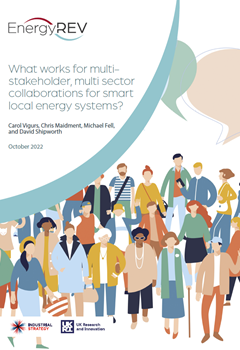Carol Vigurs, Chris Maidment, Michael Fell, and David Shipworth
18th October 2022
This review report draws from the social sciences, realist review method theories and best practice to answer the question 'What works, what doesn’t work and what should work for smart local energy systems collaboration?'.
We can see that successful collaboration between multiple stakeholders is likely to be a critical factor in the planning, setup, development and sustained operation of a SLES. All the necessary expertise and capacity to meet these demands is unlikely to be held in any one place or person, so, organisations must work together.
This report provides practical guidance on how this can be done successfully, from what has been shown to work in similarly complex, and complicated multiple stakeholder collaboration across a range of sectors.
We found key mechanisms that need to work if the collaboration were to be successful:
• Mutual advantage or gain;
• Communication;
• Trust;
• Legitimacy;
• Leadership.
We found that tensions between aims, goals and organisational values are to be expected where perspectives and purpose differ, but this also offers advantages of collaboration. A breakdown in communication was often cited as a reason for collaboration failure. Resolving disagreements by preventing misunderstandings and being realistic and open about divergent goals needs clear and fair processes, spaces and means for open and honest communication of aims and goals, and ways to measure progress against these. This suggests that collaboration itself is an ongoing process rather than a single state or entity.
